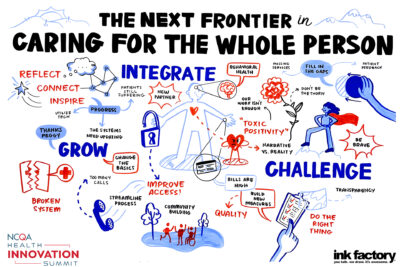Sachin Jain: Whole-Person Care Starts With Getting the Basics Right
October 13, 2025 · NCQA Communications
Health insurance is broken. That was the theme of a recent ad campaign by SCAN Health Plan. Dr. Sachin Jain, CEO of SCAN Group and SCAN Health Plan joined Julie Murchinson, Partner at Transformation Capital, for a fireside chat at NCQA’s Health Innovation Summit to discuss the need for whole-person care—and what’s holding us back.
“I’m at a moment in my career where, after having achieved some degree of conventional success, I’m interested in real success,” says Jain. “I want to start solving some of the problems we have in our system.”
Whole-person care starts with getting the basics right.
According to Jain, lots of organizations talk about whole-person care like it’s what they do, but that’s not reality for most patients. The health care industry can’t do whole-person care if we’re still failing at the basics—if we’re actually putting barriers between patients and their care. We take sick people who are at the most fragile and most vulnerable moments of their lives, and we put them through hoop after hoop to get care. Whole-person care starts with making sure that people who need health care services can access them seamlessly.
The health care industry suffers from toxic positivity.
Jain says that we’ve “normalized the abnormal” in American health care and the narrative we tell ourselves is completely divorced from most people’s experience. The pharmaceutical industry says that it invents life-saving medicines, but then prices them out of reach of people. Health systems think they are the pride and joy of the community, but push people into medical bankruptcy through predatory billing practices. Managed care companies tell people that they’re taking care of the whole person, but put their members through four different call centers, none of which are connected to each other.
Organizations need to listen to the ‘thorns’ when they speak.
Too often, when a person speaks up and says “Hey, we’re not doing what we say we do,” they are seen as a thorn in everyone’s side. People get labeled ‘thorns’ because they’re the only ones saying the thing that needs to be said. If other people decide to stand alongside the ‘thorns’ in health care, they will have the power to change the dialogue.
Population health management requires you to listen to the population.
Jain said that he gave his email address to the entire membership of SCAN Health Plan—his actual email address—and he learned a lot from reading emails from members. Too many leaders insulate themselves from real stories. The work of population health is getting closer to people and populations. Otherwise, you’re just imagining what people need as opposed to really hearing what they need.
It’s time to refresh and harmonize measures across the industry.
According to Jain, we’ve built a measurement industrial complex in health care—there are so many measures and dashboards that we’ve become numb to them. The industry needs to build a new set of measures that is less focused on process and more focused on outcomes. There is so much in health care that is not visible through measures. The question is: How do we get at some of the heart-led components of what we’re trying to do in health care, like whether we’re treating people with respect and addressing their problems in a seamless way.
“I would ask everyone to think about how we can bring change to our organizations,” says Jain. “If we’re able to show up a little bit more—like somebody who wants to change the world from whatever our vantage point is—I think we can elevate the level of dialogue.”
Join Us Next Year
Mark your calendar for the 2026 Health Innovation Summit, October 4-7, in Atlanta, Georgia!









